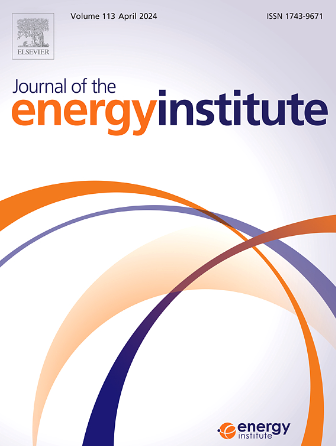An experimental investigation of 1,2-dimethoxy ethane as a fuel additive in biodiesel-fueled diesel engine
IF 5.6
2区 工程技术
Q2 ENERGY & FUELS
引用次数: 0
Abstract
Recently, researchers have focused on the addition of various additives to biodiesel and other petroleum-derived fuels to improve combustion characteristics and reduce pollutant emissions in internal combustion engines. This study explores the effects of integrating 1,2-dimethoxy ethane (1,2-DME) into reference fuels (RF), including 100 % diesel (D100), 100 % biodiesel (B100), and a blend of 50 % diesel with 50 % biodiesel (B50). In the experiment, 1,2-DME is added at volumes of 5 %, 10 %, and 15 % while engine load is at 25 %, 50 %, and 75 %. In-cylinder pressure and temperature, heat release rate (HRR), knock intensity (RI), combustion duration (CD), ignition delay (ID), brake thermal efficiency (BTE) and pollutant emissions such as carbon monoxide (CO), nitrogen oxides (NOx), hydrocarbon (HC), and smoke opacity are all evaluated. The findings reveal that increasing the 1,2-DME ratio in the reference fuels enhances HRR, in-cylinder pressure, and temperature. Notably, adding 10 % 1,2-DME to D100 at 25 % engine load significantly increases HRR by approximately 28.65 %. Generally, incorporating 1,2-DME reduces ignition delay, shortens ignition duration and intensifies knock (RI). Analysis of pollutant emissions indicates an increase in nitrogen oxide (NOx) emissions but a reductions in carbon monoxide (CO) and hydrocarbon (HC) emissions with 1,2-DME addition. Furthermore, adding 15 % 1,2-DME to D100 at 25 % engine load reduces smoke opacity by 59.2 %. In summary, the significant effects of 1,2-DME on reference fuels indicate its potential as a viable alternative fuel additive.
将 1,2-二甲氧基乙烷作为生物柴油发动机燃料添加剂的实验研究
最近,研究人员主要研究在生物柴油和其他石油衍生燃料中添加各种添加剂,以改善内燃机的燃烧特性并减少污染物排放。本研究探讨了在参考燃料(RF)中加入 1,2-二甲氧基乙烷(1,2-DME)的效果,包括 100% 柴油(D100)、100% 生物柴油(B100)以及 50% 柴油与 50% 生物柴油的混合燃料(B50)。在实验中,1,2-二甲醚的添加量分别为 5%、10% 和 15%,发动机负荷分别为 25%、50% 和 75%。对缸内压力和温度、热释放率 (HRR)、爆震强度 (RI)、燃烧持续时间 (CD)、点火延迟 (ID)、制动热效率 (BTE) 以及污染物排放(如一氧化碳 (CO)、氮氧化物 (NOx)、碳氢化合物 (HC) 和烟雾不透明度)进行了评估。研究结果表明,增加参考燃料中的 1,2-二甲醚比例可提高 HRR、缸内压力和温度。值得注意的是,在发动机负荷为 25% 的情况下,在 D100 中添加 10% 的 1,2-二甲醚,可显著提高 HRR 约 28.65%。一般来说,加入 1,2-DME 会减少点火延迟、缩短点火持续时间并加剧爆震(RI)。污染物排放分析表明,添加 1,2-DME 后,氮氧化物(NOx)排放增加,但一氧化碳(CO)和碳氢化合物(HC)排放减少。此外,在发动机负荷为 25% 的情况下,在 D100 中添加 15% 的 1,2-二甲醚可降低 59.2% 的烟雾不透明度。总之,1,2-二甲醚对参考燃料的显著效果表明,它有潜力成为一种可行的替代燃料添加剂。
本文章由计算机程序翻译,如有差异,请以英文原文为准。
求助全文
约1分钟内获得全文
求助全文
来源期刊

Journal of The Energy Institute
工程技术-能源与燃料
CiteScore
10.60
自引率
5.30%
发文量
166
审稿时长
16 days
期刊介绍:
The Journal of the Energy Institute provides peer reviewed coverage of original high quality research on energy, engineering and technology.The coverage is broad and the main areas of interest include:
Combustion engineering and associated technologies; process heating; power generation; engines and propulsion; emissions and environmental pollution control; clean coal technologies; carbon abatement technologies
Emissions and environmental pollution control; safety and hazards;
Clean coal technologies; carbon abatement technologies, including carbon capture and storage, CCS;
Petroleum engineering and fuel quality, including storage and transport
Alternative energy sources; biomass utilisation and biomass conversion technologies; energy from waste, incineration and recycling
Energy conversion, energy recovery and energy efficiency; space heating, fuel cells, heat pumps and cooling systems
Energy storage
The journal''s coverage reflects changes in energy technology that result from the transition to more efficient energy production and end use together with reduced carbon emission.
 求助内容:
求助内容: 应助结果提醒方式:
应助结果提醒方式:


